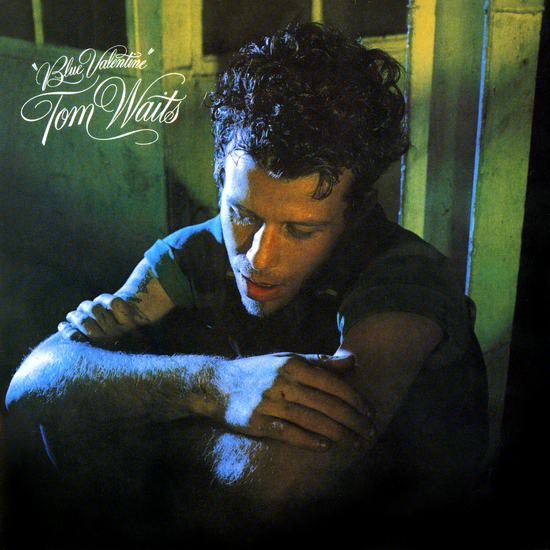

This is an utterly, utterly sublime recording.
When I first bought it on vinyl in my early twenties, I’d come to Waits via two rather odd poles of his output, namely Closing Time , his rather sweet and innocent sounding debut, and Big Time , a mostly live recording (there was also an oddball concert movie of the the same name, documenting his rather different post Swordfishtrombones sound). Around the same time I also bought Small Change , and these two records – Small Change and Blue Valentines, that is – were on heavy rotation for years after that, and remain solid favourites to this day.
Having done several albums with the brilliant rhythm section team of Jim Hughart on bass, and Shelly Manne on drums, Waits decided to change up the groove, so to speak. Having worked, in the studio at least, with a fairly stable team of players for several years, he goes for more of a pick-up band vibe, using several combinations of players on the one album. Getting a bit more raw, bluesy and electric, he brings in electric bass and keys, the latter a real rarity in most of his recorded output (numerous exceptions to this general rule can be found, but it still remains true that he usually prefers an acoustic piano).
Swapping his folkster’s acoustic steel-string guitar for a hollow bodied jazz type electric guitar, and bringing in such R&B scenester sidemen as guitarist Harold Bautista and bassist Scott Edwards, and funky jazzers like Charles Kynard on keys, and Chip White on drums – nearly all black ‘cats’, incidentally (does this really make any odds?*) – Waits thereby getting a much grittier urban sound than he’d previously gone for.
There’s a great photo, taken by Michael Dobo in 1975, of Waits on a tour bus, reading Last Exit to Brooklyn , and, on recordings like Blue Valentine and Heartattack And Vine you can really hear that influence. Waits revels in stories of sleazy urban low-life (even West Side Story’s ‘Somewhere’ is a brief romantic respite from an otherwise fairly bleak tale of gangland strife, famously reworking Shakespeare’s Romeo & Juliet, then there’s ‘Red Shoes By The Drugstore’ and ‘Christmas Card From A Hooker In Minneapolis’, in which he relates tales of minor hoodlum loserdom, whilst ‘Wrong Side Of The road’ and ‘Whistlin’ Past The Graveyard’ approach the panegyric in celebrating the mythical delinquent outlaw outsider), and, both here and on Vine, the more sordid end of that world, with numerous songs dealing in violence and death (‘Romeo Is Bleeding’, ‘$29.00’, and ‘A Sweet Little Bullet From A Pretty Blue Gun’).
The whole album is brilliant, but personal favourites include the sleazy groove of ‘Romeo Is Bleeding’, whose rhythm section benefits from congas, a sizzle ride cymbal, and one of the best reverb treated cross-stick snares I’ve ever heard recorded, not to mention Kynard’s extremely funky keys work. In ways this harks back to Waits’ raps of earlier years – in essence it’s a recitation with a bit of a chorus – but it’s reached a point where the musical backdrops have grown in sophistication. Then there’s strings and vocal feature (and a rare instance of Waits recording someone else’s composition), ‘Somewhere’, from West Side Story , with the ever reliable Bob Alcivar, who added so much to so many of Waits’ best recordings, working his magic to stunning effect: it’s just Waits gravelly voice and the phenomenally well arranged and recorded strings, and it packs a real punch, far better than any classical or stage recordings of Bernstein’s music I’ve ever heard.
And then, leaving aside ‘Somewhere’, as it’s not a Waits original, there are the two really beautiful emotionally wrought ballads: ‘Kentucky Avenue’, the only solo piano ballad (albeit there are some strings towards the end) which can reduce boulders to tears, and the fabulous title track, which Waits delivers more-or-less solo, except for a great bluesy electric guitar solo from Ray Crawford (Crawford was originally a reeds player, which explains why his phrasing as a guitar player is so exquisite and expressive). Tom Waits was, and no doubt still is, one unbelievably cool cat, and this music drips soul. Not bad for a white guy! When I first owned the album, I spent ages trying to learn and reproduce ‘Blue Valentines’: the guitar part is pretty simple in most respects, so copping the chords and arrangement wasn’t hard, but what I could never nail satisfactorily was the nuanced rhythm Waits brings to it, and then there’s that voice.
I mostly only review stuff I really like, so I often give five stars. This album tho’, if I could only give it ten, it really is that good!
* I do think it’s a deliberate move, on Waits’ part, to try and get a grittier, rootsier urban feel; what James Brown and others might call ‘on across the other side of the tracks’, so to speak.
